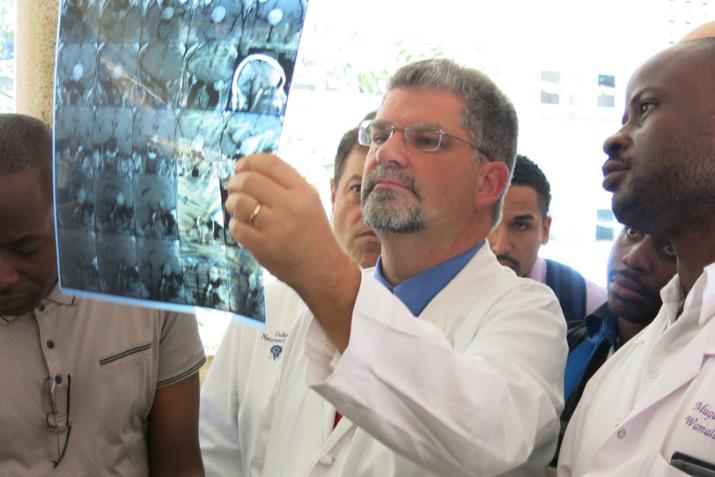
This project builds on a 10-year collaboration between Duke, Makerere and Mbarara Universities, led by Michael Haglund (center), to build state of the art neurosurgery units at Mulago and Mbarara Hospitals.
Published March 14, 2017, last updated on September 15, 2021 under Research News
In Uganda, where about 700,000 people are living with untreated epilepsy due to traumatic brain injuries and birth defects, there are only four neurologists who can treat the disease with medication. The capacity to monitor epilepsy with electroencephalogram (EEG) or perform epilepsy surgery—which can cure up to 75 percent of epilepsy patients—is currently non-existent.
Michael Haglund, distinguished professor of neurosurgery, neurobiology and global health, is determined to change the game for Ugandan epilepsy patients, and he’s laying the groundwork with a new grant from the UCB Societal Responsibility Fund to establish the Uganda Epilepsy Centers of Excellence.
“With road traffic accidents, brain tumors and childhood epilepsy, a huge burden is laid on families that is exacerbated by the stigma of epilepsy,” said Haglund, who is also chief of the Duke Global Neurosurgery and Neurology division. “We hope to develop the capacity to diagnose and treat—both medically and surgically—the large number of Ugandans afflicted by epilepsy.”
About the Center
The new center will be associated with Mulago National Referral Hospital in Kampala and Mbarara Regional Referral Hospital in Mbarara and will span the spectrum of epilepsy care from diagnosis to treatment to surgery.
This project builds on a decade of collaboration between Duke, Makerere and Mbarara Universities, led by Haglund, to build state of the art neurosurgery units at Mulago and Mbarara Hospitals. The project goals include:
- Provision of epilepsy equipment for diagnosis and localization of epileptic foci. Some of this equipment will be acquired through Duke Global Health PLUS (Placement of Life giving Useable Surplus); some will be donated by Cadwell Industries, a company that manufactures medical devices for neurophysiology; and some will be purchased with grant funds.
- Training of epilepsy neurologists and technicians. Four Ugandan neurologists and six technicians will spend up to six months at the Duke University Epilepsy Center, and two neurologists and two epilepsy technicians from Duke will spend two weeks in Uganda for in-country collaborations.
- Supplies and upfitting of six neurosurgery rooms, three at Mulago Hospital and three at Mbarara Hospital, for monitoring of epilepsy and diagnosis and localization of epileptic disorders.
- Establishment of an epilepsy and neurology training program at Mulago and Mbarara Hospitals, where there are currently only three neurologists are at Mulago and one at Mbarara.
”Currently there is no real ability to monitor and diagnose epilepsy anywhere in the country,” said Haglund. With the help of Duke neurologists Brad Kolls and Danny Laskowitz and a partnership with Cadwell Industries, he said, they’ll be able to extend epilepsy monitoring beyond the hospital setting. They plan to send teams of neurologists and local social and medical workers to villages to identify patients with epilepsy who can then be referred to the main centers for treatment.
In addition, under the mentorship of Deborah Attix, associate professor in psychiatry and behavioral sciences, Master of Science in Global Health students Nadine Sanchez and Payal Chakraborty, will perform a country-wide prevalence study this summer to determine the burden of epilepsy in Uganda.
“We intend to have the Uganda Epilepsy Center of Excellence program running at full speed within three years,” said Haglund. “And we hope to expand the project to other regions of the country within five years, based on the needs we identify through a systematic nationwide epilepsy survey.”
About the Funder
The UCB Societal Responsibility Fund is a joint venture between UCB, a global biopharmaceutical company with a focus on neurology and immunology, and the King Baudouin Foundation, which seeks to strengthen the capacity of organizations and individuals with a focus on areas such as poverty, social justice, health and civic engagement. The grant is for a total of €450,000 over three years.
Learn more about the Duke Global Neurosurgery and Neurology division.


